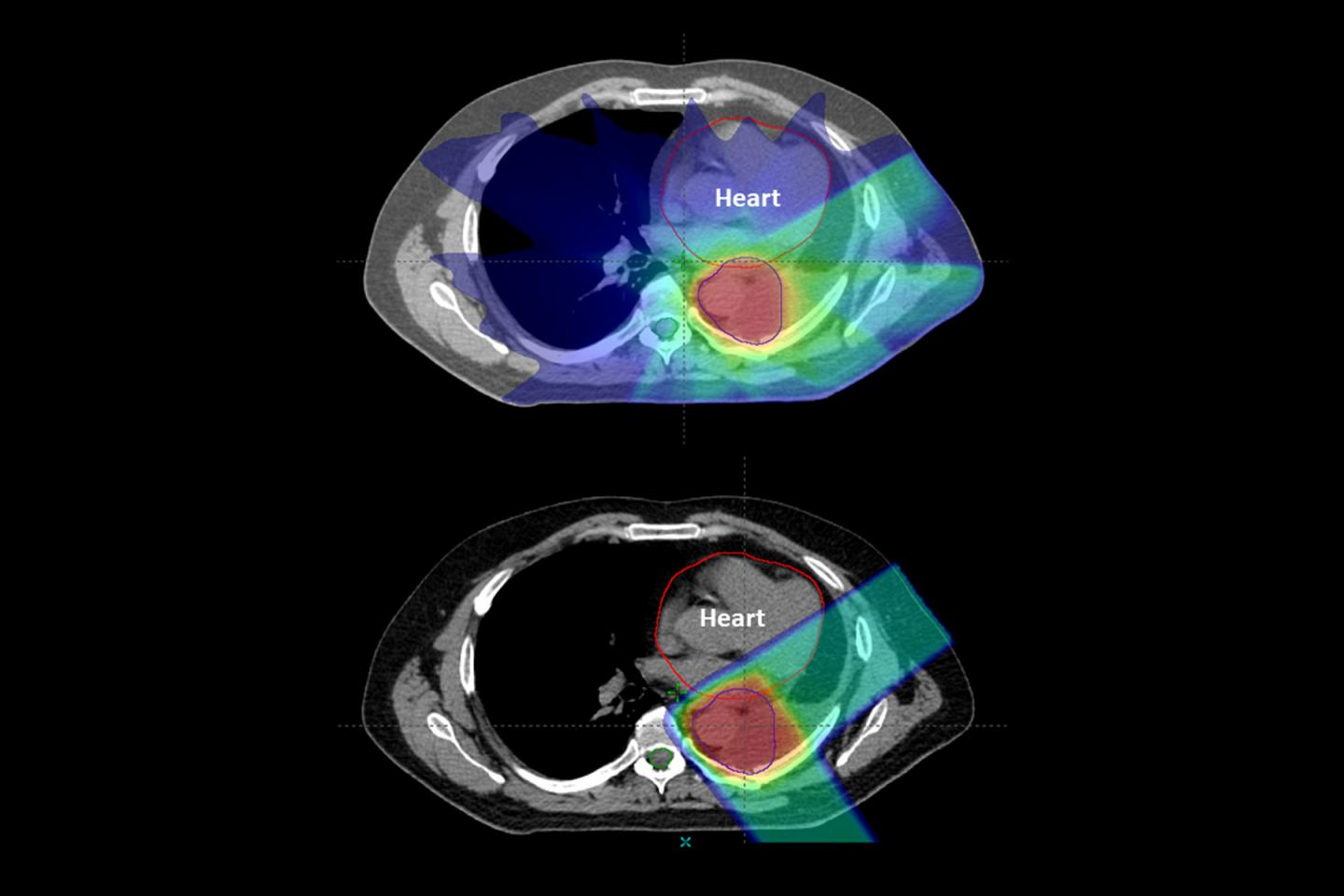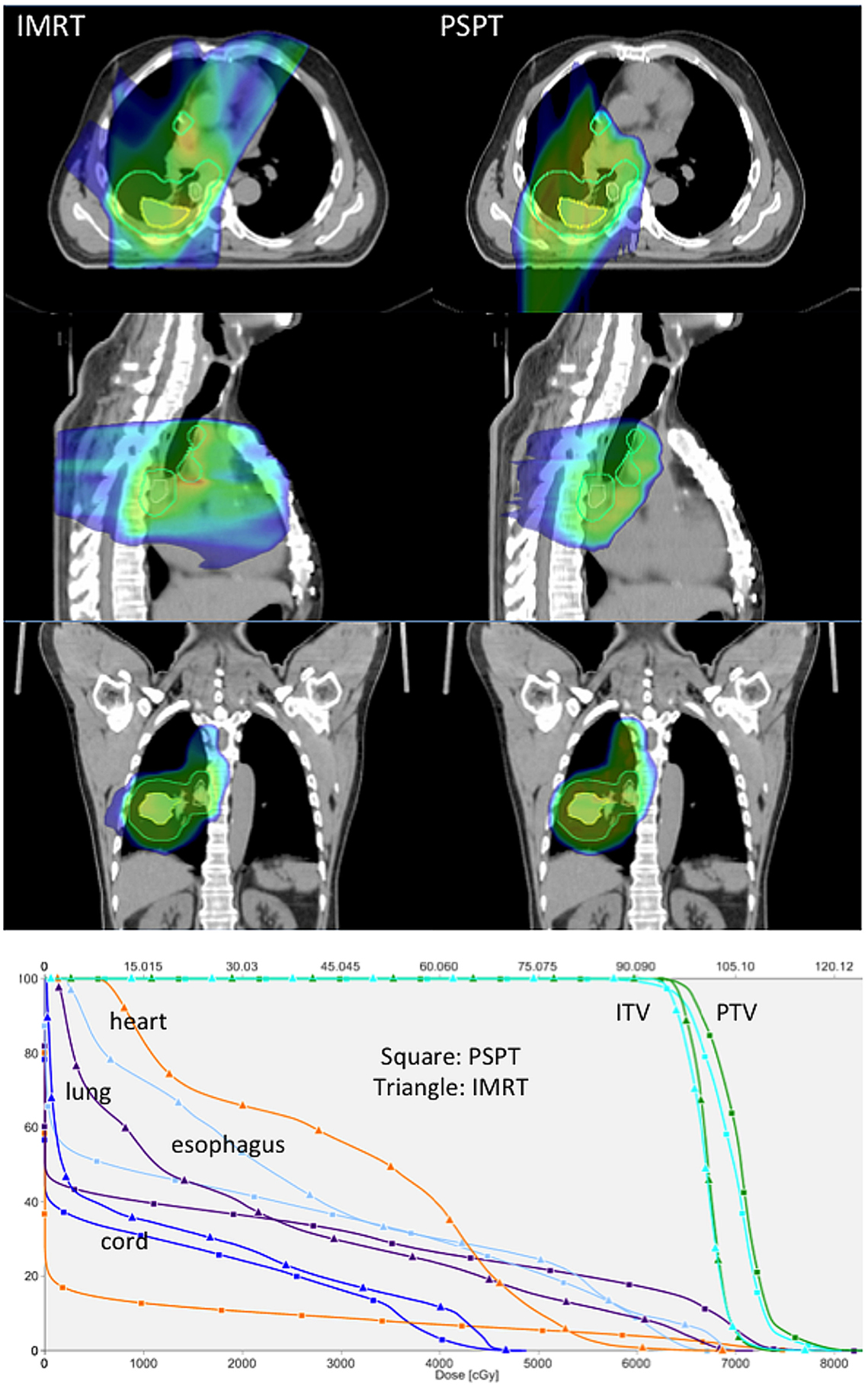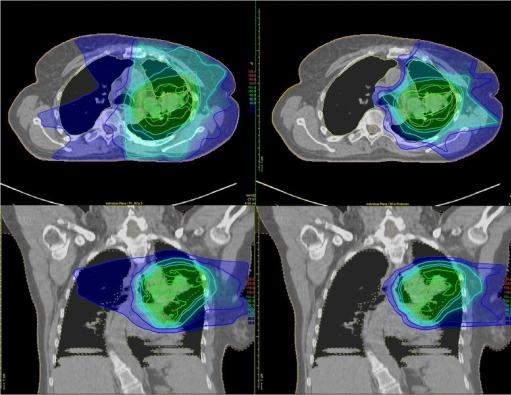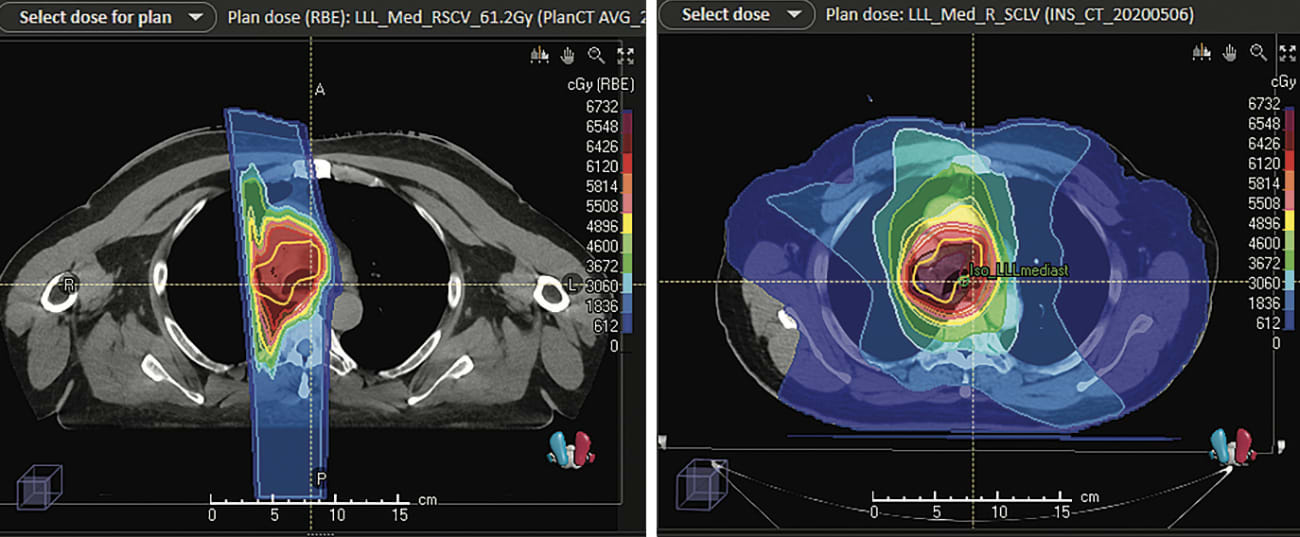Head and neck cancers. Proton beam therapy an advanced form of external radiotherapy can be used to treat cancers in a variety of areas of the body and can be combined with other treatments such as chemotherapy and surgery to provide the best chance of removing the tumour in its entirety.

Long Term Outcome Of Phase I Ii Prospective Study Of Dose Escalated Proton Therapy For Early Stage Non Small Cell Lung Cancer Radiotherapy And Oncology
Using proton technologys advanced image guidance and ability to precisely target tumors in the lungs our specialists can deliver powerful radiation dosages with optimal accuracy sparing critical nearby structures such as the esophagus lung heart and spinal cord.

Can proton therapy be used for lung cancer. Lung cancer can cause tumors and infiltrate the lymph nodes in the lungs. For lung cancer this means that proton therapy can deliver the same dose to the tumor with less radiation damage to the healthy lung tissue compared with standard radiation treatments such as three-dimensional conformal radiation therapy 3D-CRT and IMRT. 3 Additionally proton therapy can be used to deliver more radiation to the tumor to improve the outcomes for lung cancer patients.
This is because there is less damage to normal cells. There is one pilot study 13 phase I andor II studies one phase III study and two medical physics studies. The precise area of delivery offered by proton beam therapy may be beneficial for brain tumors in which even small amounts of damage to nearby normal tissues could have significant side.
Proton beam therapy PBT through its characteristic Bragg peak has the potential to decrease the toxicity of radiotherapy and subsequently improve the therapeutic ratio. Radiotherapy is an essential component of the definitive treatment of early-stage and locally-advanced lung cancer and the palliative treatment of metastatic lung cancer. We help with companionship showering and medical escort for seniors with cancer.
Proton therapy for lung cancer may be used for early-stage cancers that cannot be treated with surgery or for a recurrence when conventional radiation therapy has already been given. Because the proton beams do not penetrate beyond the tumor proton therapy reduces the risk of treatment-related side effects due to radiation damage to normal tissues. The retrospective study of 200 patients found that 11 of patients who received proton therapy experienced mini-strokes after treatment as compared to 82 of patients who received photon radiation therapy.
Proton therapy significantly reduces the negative impact of radiation on the patients healthy organs by. Proton beam therapy can be used to treat lung cancer usually before or after surgery or following chemotherapy. Proton Therapy may be beneficial for several recurrent cancer types including cancers of the brain head and neck lung and breast as well as gastrointestinal genitourinary and gynecologic cancers.
We help with companionship showering and medical escort for seniors with cancer. These cancers can be difficult to treat with standard radiotherapy or surgery. Ad Our cancer care services include companionship showering meal prep and medical escort.
Central nervous system cancers. SMALL CELL LUNG CANCER. Notable benefits of proton therapy for cancer recurrence.
What are the benefits of proton therapy. Proton therapy can be effective in treating lymphoma breast cancer pancreatic cancer prostate cancer lung cancer throat cancer thyroid cancer and various other conditions. The noninvasive nature of Proton Therapy is a significant and beneficial leap forward in the treatment of lung cancers.
For example both chemotherapy and traditional radiation for lung cancer can irritate the esophagus making it painful and difficult for patients to eat. Spinal and pelvic sarcomas. Thats where proton therapy has the advantage for many lung cancer and other thoracic cancer patients.
Cancers that can be treated with proton beam therapy include. The using proton beam therapy will aim to shrink a tumour before removal or after surgery to kill any remaining local cancer cells that may have been left behind. Studies show some lung cancer patients can receive higher therapeutic doses with fewer radiation side effects.
Proton therapy may also allow the use of a higher radiation dose to the tumor maximizing the chance of destroying it. Of the trials 13 are open to patient accrual and 4 are closed. At the time of this writing there are 17 clinical trials that are investigating the use of proton therapy for lung cancer.
Proton beam therapy can be used to treat cancers that are close to important structures. Proton therapy is often used to treat both early-stage and advanced cancers due to the minimal side effects of proton radiation and its ability to treat both malignant and benign tumors. Traditional radiation therapy carries significant risk when used to treat lung cancer because it can cause inflammation and unintentional damage to the heart and the esophagus.
And because proton therapy may cause fewer side effects future trials could also explore whether combining proton therapy with chemotherapy might be more tolerable for patients the authors wrote. Over the past few years proton therapy for the treatment of lung cancer has significantly increased the survival and quality of life in patients with advanced lung cancer. Clinical trials are ongoing to see if proton therapy can be used to treat other types of cancers including lymphoma and breast cancer.
Proton beam therapy may cause fewer side effects than standard radiotherapy. Research shows that proton therapy is as effective as X-ray radiation in treating non-small cell lung cancer and may reduce side effects such as inflammation of the lungs and esophagus. Proton therapy for lung cancer is now considered a treatment option for patients whose cancer is limited to the chest.
In patients with limited-stage small cell lung cancer proton therapy combined with chemotherapy provides aggressive treatment that can be less toxic than conventional X-ray radiationThis regimen could make the treatment more tolerable with less side effects such as painful swallowing and radiation induced pneumonia. Trials performed at the University of Florida Health Proton Therapy Institute demonstrate that proton therapy offers reduced normal lung esophageal and heart exposure when compared with conventional photon X-ray therapy. A recent study from Penn Medicine has found that treating lung cancer patients with proton therapy may help reduce the risk of radiation-induced heart diseases.
Ad Our cancer care services include companionship showering meal prep and medical escort.

Bjr Journals Auf Twitter Proton Therapy Special Feature Article Proton Therapy For Locally Advanced Non Small Cell Lung Cancer Https T Co U6dt8s3z2t Radonc Medphys Radiotherapy Protontherapy Radres Https T Co Vk4zzwdosw

Yi02 02 Modern Treatment Techniques In Lung Cancer The Advantages Of Conformal Radiotherapy Imrt And Proton Therapy Journal Of Thoracic Oncology

Stage Iii Non Small Cell Lung Cancer Patient Planned For Proton Pencil Download Scientific Diagram

Proton Therapy Has Improved The Low Dose Bath To The Heart And Lungs Download Scientific Diagram

Patterns Of Local Regional Failure After Intensity Modulated Radiation Therapy Or Passive Scattering Proton Therapy With Concurrent Chemotherapy For Non Small Cell Lung Cancer International Journal Of Radiation Oncology Biology Physics

Liquid Fiducial Marker Applicability In Proton Therapy Of Locally Advanced Lung Cancer Radiotherapy And Oncology

Exploring Proton Therapy S Effectiveness On The Most Common Form Of Lung Cancer Md Anderson Cancer Center

Proton Therapy For Lung Cancer May Help Reduce Risk Of Heart Diseases Imaging Technology News

Proton Therapy Case Study Lung Cancer Johns Hopkins Medicine

Proton Therapy For Lung Cancer Procure Proton Therapy

Proton Therapy For Lung Cancer Scca Proton Therapy Center

Proton Beam Therapy Is A Safe And Feasible Treatment For Patients With Second Primary Lung Cancer After Lung Resection Ono 2019 Thoracic Cancer Wiley Online Library

Frontiers Particle Therapy For Non Small Cell Lung Tumors Where Do We Stand A Systematic Review Of The Literature Oncology

Online Adaptive Dose Restoration In Intensity Modulated Proton Therapy Of Lung Cancer To Account For Inter Fractional Density Changes Physics And Imaging In Radiation Oncology

Figure 2 From Can Proton Beam Therapy Be Clinically Relevant For The Management Of Lung Cancer Semantic Scholar

Lung Tumor Treatment Northwestern Medicine Proton Center

Supplemental Materials For Robust Optimization In Intensity Modulated Proton Therapy To Account For Anatomy Changes In Lung Cancer Patients Radiotherapy And Oncology

Is Proton Therapy Safer Than Traditional Radiation National Cancer Institute

Proton Therapy Faqs For Lung Cancer Johns Hopkins Medicine
Post a Comment
Post a Comment